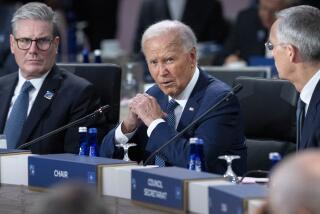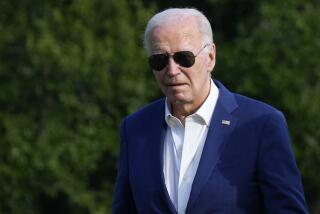Bush Resumes Meetings but Trade Effort Misses U.S. Goal : Japan: New concerns about his health are raised after he collapses from flu. He fails to win the commitment he sought on access to markets.
- Share via
TOKYO — President Bush today ended his talks in Japan with little more than Tokyo had already promised in a disappointing conclusion to a trade mission overshadowed by the shock of his sudden collapse at an official dinner here.
Japan agreed to increase slightly its targets for purchases of U.S. auto parts, but Bush failed to win the broader commitment he had sought for Tokyo to open its markets and significantly reduce its trade surplus with the United States.
An “action plan” issued by the two nations here today also failed to include a firm commitment for a Japanese financial contribution to the vast superconductor project that had been a high priority for Bush in his visit here.
“There is no doubt that we have much more to do,” Bush conceded at a joint news conference this afternoon with Japanese Prime Minister Kiichi Miyazawa. But he was upbeat as he said the two nations had “made headway” and pronounced his visit a “success.”
Bush emerged earlier in the day pale but apparently fit after vomiting from stomach flu and then collapsing in his chair at the prime minister’s residence here with what he insisted was no more than a “24-hour bug.”
The incident raised new concerns about the President’s health as his rigorous reelection campaign begins. But Bush sought to play down the severity of the incident: “I felt so embarrassed, I really did.”
And he had clearly regained his sense of humor by the time of the news conference as he fended off questions about whether his age and health would become a political liability. “Even Democrats get the flu,” he said.
The chilling spectacle at the head table of an official banquet was captured on television cameras as Bush slumped limply to the floor, mouth agape. White House spokesman Marlin Fitzwater said the President had fainted.
Bush, somewhat sheepish-looking, rose to his feet five minutes later but appeared wan and disheveled as he was rushed back to his temporary residence at the Akasaka Palace under the care of his physician.
Fitzwater said today that White House doctors are confident that Bush’s sickness was not related to any other health problem. “The President is human,” he said. “He gets sick.”
But the sudden illness forced Bush to cancel morning appearances here today. After his afternoon news conference, the White House canceled a Bush speech Friday morning that had been billed as a major address to wrap up his 12-day Asian swing.
Bush’s eyes looked dull and he appeared tired as he arrived for an afternoon meeting with Miyazawa, leaving the Akasaka Palace for the first time since being taken ill some 17 hours earlier.
He smiled ruefully, however, when asked whether he had seen television footage of his collapse. “I’m not sure I want to,” he said. “But I heard it was pretty dramatic.”
The incident created a temporary panic at the elegant dinner, where witnesses said Bush’s eyelids seemed to flutter as he was stricken. Secret Service agent George Robinson clambered across a table to him, and Miyazawa briefly cradled the President’s head in his hands.
First Lady Barbara Bush at one point left her seat to look on from her husband’s side, and other agents took protective positions around the room to keep other guests at bay.
But as Bush eventually rose to face the audience, his jacket removed and tie loosened, Miyazawa led vigorous applause and the President was said to have remarked to his agents: “I just wanted to get a little attention.”
Bush’s collapse occurred nine days into a grueling four-nation trip in which the President has traveled almost 20,000 miles across 16 time zones, has appeared chronically weary and acknowledged Wednesday that he has had trouble sleeping.
Wednesday’s episode came nine months after an incident in which Bush was flown to Bethesda Naval Hospital after suffering from an irregular heartbeat while jogging at Camp David. That malady has since been treated as part of a cure for Grave’s disease, and Bush was given a clean bill of health by his doctors early this fall. But the public display of a new problem, even if temporary, sent waves of unease through Republican political circles.
Asked about his campaign plans, Bush said last summer that only a health problem would prevent him from seeking reelection, and added: “I don’t have one right now.”
Fitzwater stressed that there is “no connection whatsoever” between the incident and his earlier heart problem, and said the incident would have “absolutely no effect” on Bush’s reelection plans.
And Bush took pains to point out, as he emerged from seclusion, that doctors had tested the functioning of his heart with an electrocardiogram after he collapsed. The results were “perfect, absolutely perfect,” the President declared.
But the vivid image of a stricken, distressed President raised new questions about the vitality of the 67-year-old Bush and focused renewed attention on Vice President Dan Quayle, his designated running mate. Polls still show the vice president suffers from a lack of public favor, and Bush’s illness is bound to again thrust open to public debate the question of whether Quayle is adequately qualified for a succession to the presidency.
To reassure an anxious world, Fitzwater appeared on live television within an hour after Bush’s collapse to announce that the President was “feeling fine.” He said Bush was under the care of his personal physician, Burton Lee, and another White House doctor, Allen Roberts, who monitored his condition during through the night.
This morning, as Bush remained secluded in the palace that serves as his residence here, Fitzwater said that Bush’s vital signs had remained “normal” Wednesday night and remained so today.
The White House quickly relayed word of Bush’s collapse to Quayle and other senior officials in Washington, where it was still before dawn, but Fitzwater insisted that the notification was for informational reasons only. “There was no need for any special alarm,” he said.
Bush himself telephoned Quayle, Chief of Staff Samuel K. Skinner and members of his family after rising this morning at 6:30 to assure them that he was well. Commerce Secretary Robert A. Mosbacher and Treasury Secretary Nicholas F. Brady took his place at morning events.
Members of Bush’s delegation, including a number of reporters, have suffered flu symptoms on the journey. In Tokyo, a virulent strain of stomach flu was reported in the Japanese media to be widespread. But the President’s stunning, swift collapse raised questions as to whether he might have been weakened by a breakneck schedule.
Bush has worked well into the night nearly every day since he departed Washington on Dec. 30. His schedule from Australia to Japan has been crowded with speeches, meetings and other events. Nevertheless, he spent part of Wednesday afternoon playing what aides said were a “vigorous” two sets of tennis with U.S. Ambassador Michael Armacost as his partner against Emperor Akihito and his son, Crown Prince Naruhito.
In an interview with an NBC correspondent after his tennis match, he said he felt “pretty good right now,” but that it had been “a long trip” and that he often awakened in the middle of the night.
Before the state dinner, however, Bush was said to have told his physician, Lee, that he felt ill. Fitzwater said Lee examined the President and determined that he had “a touch of the flu” but that Bush wanted to attend the dinner anyway.
But there was apparently no other indication he was so ill until Bush collapsed in his chair and began to slump toward the ground about 8:20 p.m., as a meat course was being served. A Secret Service agent helped Bush to the floor while physicians, nurses and other agents rushed to the President’s side. Members of the audience were urged to remain seated.
The Japanese cameras showed that Bush remained on the floor for five minutes. As he rose, wearing a shirt with open collar, agents helped him to don a green overcoat. Bush, looking pale, shook his head apologetically and raised his hand in a salute to the audience. He shook Miyazawa’s hand, and a White House nurse reached from behind him to tidy his mussed hair.
An ambulance that travels with the White House motorcade was rushed to a front entrance and an empty gurney rolled into the residence. Japanese security pushed and pulled photographers seeking a perch to film the event as the red lights of the ambulance flashed, providing a frightening and chaotic scene broadcast live on Tokyo television.
The gurney was rolled back out from the residence at 8:29 p.m., unoccupied. Bush himself emerged two minutes later, walking steadily but slowly under his own power. He chose to ride not in the ambulance but in the presidential limousine. He looked haggard but told reporters: “I feel good.” He sped off in his motorcade and arrived at the palace about 8:40 p.m.
More to Read
Get the L.A. Times Politics newsletter
Deeply reported insights into legislation, politics and policy from Sacramento, Washington and beyond. In your inbox twice per week.
You may occasionally receive promotional content from the Los Angeles Times.










